|
|
|
Sort Order |
|
|
|
Items / Page
|
|
|
|
|
|
|
| Srl | Item |
| 1 |
ID:
178498
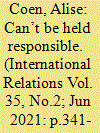

|
|
|
|
|
| Summary/Abstract |
States have increasingly moved away from refugee protection, intensifying the vulnerability of refugees and asylum-seekers. Drawing on theories of norm dynamics within International Relations (IR), this article argues that departures from refugee protection can be partly explained by the weakness of the normative principles governing the treatment of individuals fleeing persecution. Ambiguities, diverging interpretations, and varying levels of codification complicate efforts to hold states accountable to a complex bundle of human rights standards surrounding refugee and asylum protection. These weaknesses in the international refugee regime bolster norm-evading behavior wherein governments deliberately minimize their obligations while claiming technical compliance. Drawing on an analysis of US refugee and asylum policies under the Trump administration, the article reveals how norm evasion and accountability challenges emerge in the context of ambiguous standards vis-à-vis non-refoulement, non-detention, non-penalization, non-discrimination, and refugee responsibility-sharing.
|
|
|
|
|
|
|
|
|
|
|
|
|
|
|
|
| 2 |
ID:
178494


|
|
|
|
|
| Summary/Abstract |
This article explores the interaction between European Union (EU) foreign policy and the external dimension of fisheries policy in a specific case: a dispute over snow crab fisheries around the Norwegian Arctic Archipelago of Svalbard. We do two things: first, we examine a specific case that concerns both EU foreign policy and fisheries policy in order to understand the workings of the EU regarding these two policy domains. Second, we connect the dots between the EU’s external fisheries policy and the EU as a foreign policy actor in general, examining how intra-institutional dynamics matter when studying policy and its related developments in Brussels. This analysis of the snow-crab dispute between the EU and Norway illustrates how a relatively minor issue in fisheries policies is also relevant to the study of the foreign policy of the EU, and more generally for the links between foreign policy and fisheries as a nexus that is increasingly relevant in international politics.
|
|
|
|
|
|
|
|
|
|
|
|
|
|
|
|
| 3 |
ID:
178496
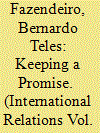

|
|
|
|
|
| Summary/Abstract |
States, governments and leaders often reject one another’s role prescriptions. They stick to enacting their role, what they consider to be their central purpose and main promise within a given international society. By applying the main tenets of role theory, this essay looks at the reasons why actors sometimes reject the prescriptions of others, including attempts at bargaining. Rather than claiming that those prescriptions are rejected on account of the pursuit of self-identity or ontological security, this essay suggests that those positions have more to do with defending the public credibility of one’s master role, the core promise made by an actor to (domestic and/or international) audiences. Master roles have to do with the main promises of an actor in a given social and political order, thereby providing credibility to a domestic and international audience. Without maintaining credibility, the actor is unlikely to be able to fulfil master and auxiliary roles as initially set out. The essay contributes to role theory in three ways: by looking beyond explanations centred on identification and ontological security, by conversely building upon public credibility, and also by showing how audiences and roles matter to illiberal regimes. To illustrate the argument, the essay addresses the government of Uzbekistan’s attempt to keep credibility in the face of Russian altercasting in the 1990s.
|
|
|
|
|
|
|
|
|
|
|
|
|
|
|
|
| 4 |
ID:
178497
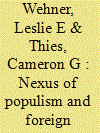

|
|
|
|
|
| Summary/Abstract |
The term populism has recently gained visibility in the media and policy world to describe the foreign policy principles, rhetoric and strategies of political actors in the United States and some European states. Yet, populism is nothing new in Latin America where it has enjoyed a long tradition among leaders of various countries. Populism has thus far largely been treated as a national phenomenon with few international manifestations. Thus, this article adopts the concept of populism and its core components such as anti-elitism, the people, and the general will within a role theory framework to trace the foreign policy roles that populist governments play as a first step to improving our knowledge on the nexus of populism and foreign policy. We examine this framework in the context of the foreign policy of Carlos Menem of Argentina and Hugo Chávez of Venezuela.
|
|
|
|
|
|
|
|
|
|
|
|
|
|
|
|
| 5 |
ID:
178491
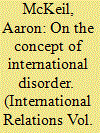

|
|
|
|
|
| Summary/Abstract |
International relations today are widely considered to be experiencing deepening disorder and the topic of international disorder is gaining increased attention. Yet, despite this recent interest in international disorder, in and beyond the academy, and despite the decades-long interest in international order, there is still little agreement on the concept of international disorder, which is often used imprecisely and with an alarmist rather than analytical usage. This is a problem if international disorder is to be understood in theory, towards addressing its concomitant problems and effects in practice. As such, this article identifies and explores two ways international order studies can benefit from a clearer and more precise conception of international disorder. First, it enables a more complete picture of how orderly international orders have been. Second, a greater understanding of the problem of international order is illuminated by a clearer grasp of the relation between order and disorder in world politics. The article advances these arguments in three steps. First, an analytical concept of international disorder is developed and proposed. Second, applying it to the modern history of international order, the extent to which there is a generative relationship between order and disorder in international systems is explored. Third, it specifies the deepening international disorder in international affairs today. It concludes by indicating a research agenda for International Relations and international order studies that takes the role of international disorder more seriously.
|
|
|
|
|
|
|
|
|
|
|
|
|
|
|
|
| 6 |
ID:
178495
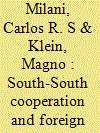

|
|
|
|
|
| Summary/Abstract |
Brazil’s government has historically engaged with other developing countries to promote technical cooperation. Since the 1988 federal Constitution, different presidents have paid attention to this foreign policy agenda. However, it was particularly under the Workers’ Party’s administrations (2003–2016) that South-South cooperation (SSC) gained political ground, rooted in official principles of South-South solidarity, horizontality, non-interference in domestic affairs, and the defence of a multipolar world-vision. In this article, based on the argument that international development cooperation (IDC) is a key instrument of a country’s economic diplomacy, we analyse the perceptions of Brazilian diplomats about SSC in order to understand Brazil’s interests and motivations in this field. Methodologically, the article discusses the main results of a survey conducted between 25 August and 23 September 2016 among 349 Brazilian individuals, who correspond to approximately 22 per cent of Brazil’s active diplomats. The survey results showed that Brazilian diplomats generally have a favourable perception on Brazil’s SSC programmes, and that a great majority of them has already acted in SSC activities. Still, the issue of political conditionality brings in cleavages, indicating that there is a large group of Brazilian diplomats who openly support SSC as an instrument of national interests and not because of the official narratives related to a ‘solidarity with the South’ or ‘the promotion of human rights’. As a consequence, with the exception of perceptions on political conditionalities and economic criteria, the majority of diplomats share commonalities that also correspond to the government’s official rhetoric between 2003 and 2016. This article is structured around the following three sections: (1) South-South cooperation as a foreign policy agenda, (2) Diplomats as agents of Brazil’s South-South cooperation and (3) Presenting and discussing the perceptions of Brazilian diplomats.
|
|
|
|
|
|
|
|
|
|
|
|
|
|
|
|
| 7 |
ID:
178493
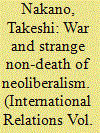

|
|
|
|
|
| Summary/Abstract |
This essay provides a hypothesis about how geopolitical environments significantly affect the rise and fall of modern economic ideologies. First, it articulates how the two world wars transformed political, social and ideological conditions into those favourable for the rise of Keynesianism. Second, it theoretically identifies the political and social foundations of Keynesianism with expanded state capacity, social cohesion and social equality, all of which were by-products of major wars. Third, it shows how the transformation of geopolitical environments and the change of the nature of warfare since the late 1960s undermined the political and social foundations of Keynesianism and paved the way for the rise and dominance of neoliberalism. By shedding light on military and geopolitical dimensions of international environments, our hypothesis well explains the sudden fall of Keynesianism in the 1970s and the current robustness of neoliberal dominance.
|
|
|
|
|
|
|
|
|
|
|
|
|
|
|
|
| 8 |
ID:
178492
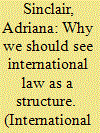

|
|
|
|
|
| Summary/Abstract |
This article identifies how three dominant ideas of international law (as a process, an institution and a practice) see its agency, concluding that all three share a reluctance to see international law as doing anything more than enabling the operation of other actors, forces or structures. This article argues that we should see international law as a structure because it possesses both the surface structure of rules, principles, processes, personnel and material elements of the international legal system and a deep structure of values that sits deep within our subconscious. As Shklar’s idea of legalism shows us, legalism plays a powerful role in shaping all our understandings of ourselves and the world that surrounds us. Seeing international law as a structure enables us to see how it locates actors within a social hierarchy and how it behaves in similar ways to recognised structures like capitalism and racism.
|
|
|
|
|
|
|
|
|
|
|
|
|
|
|
|
|
|
|
|
|